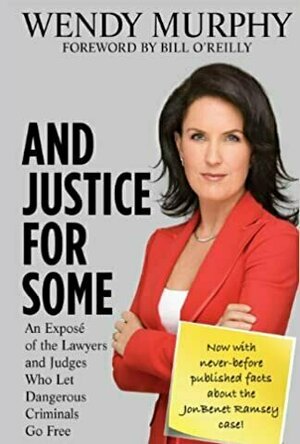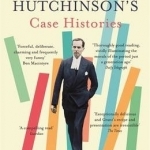
A Dark Spring (Stories That Twist & Tangle)
Laura N. Andrews, R.M. Gilmore, M. Billiter, Kenneth Jobe, Barb Shuler, M.C. St. John, Ricky Wells and Kim Deister
Book
Eight original tales of suspense that will tangle your senses and keep you gripped. From murder to...
Suspense

And Justice For Some: An Expose of the Lawyers and Judges Who Let Dangerous Criminals Go
Book
FULLY REVISED EDITION CONTAINING NEVER-BEFORE PUBLISHED FACTS ABOUT THE JONBENET RAMSEY CASE, and...

The Endless Shimmering by And So I Watch You From Afar
Album Watch
Instinct. We all know what it is, but are hard pressed to acknowledge just how it guides us....
rock
Hazel (1853 KP) rated Small Great Things in Books
May 24, 2017
The gist of the storyline is that a baby dies whilst under the care of a nurse, prompting the grieving parents to take her to court with the accusation of murder. Although that sounds like an interesting story, it barely begins to describe what the book is about. The character on trial, Ruth, is an African American labour and delivery nurse – something that in this day and age need not by an issue. On the other hand, the parents of the baby are White Supremacists: seriously racist with the belief that white people are the master race. The father, Turk, refuses to let his wife and child be treated by Ruth, however circumstances result in her being the only nurse available to watch Davis, when, unfortunately, he so happens to go into cardiac arrest. Although the reader knows that Ruth is not at fault, Turk insists she murdered his child – but is he accusing her of medical negligence, or punishing her for being black?
Three characters, all with different views and experience when it comes to racism, alternately narrate Small Great Things. Ruth and Turk represent the extremes at either side of the scale. Ruth experiences first hand the negative impact of prejudice in the American system and society, not only through this court case, but in everyday life as well. She also reveals the difficulties growing up in a predominately white environment, never feeling like she fitted in with her peers. Alternatively, Turk spent his teenage years attending KKK rallies, participating in a white power movement, and beating up anyone who was different: black, foreign, gay, Jewish and so forth.
The third character represents the majority of white people living in America. Kennedy is a public defender and the lawyer assigned to Ruth’s case. Like most of the population, she believes that she is not racist, and persuades Ruth to leave the colour of her skin out of the argument. However, as she gets to know her client, she begins to realize that it is nigh on impossible to ignore racial prejudice.
Picoult shocks the reader on two accounts: one, the way that people of colour have been, and still are, treated; and two, the revelation that an invisible empire of White Supremacists are living amongst us. Yet there is a third way in which Picoult provokes outrage – she indirectly accuses the reader of being racist, too.
There is always something to learn in a Jodi Picoult novel, for instance medical terminology, or the way in which a court trial is conducted. Small Great Things provides a lot more eye opening information than any of her previous books, unveiling facts about such a controversial subject.
Through Kennedy, the reader’s eyes are opened to the racial discrimination that we all turn a blind eye to. Ignored are the difficulties African Americans suffer when going shopping, applying for jobs, attending school, walking down the street, sitting on a bus, and so forth. Picoult asks me as a reader to think about how my life has been affected by racial discrimination: being served politely in shops because I am white, not having my ethnicity questioned when applying for college etc. Living in Britain I have not experienced openly hateful comments or behaviours towards people with a different skin tone – I used to believe this was primarily an American problem. Yet, Small Great Things has really made me think about the hierarchy of power within society, particularly in regards to the ethnicity of those at the top, compared with those at the bottom.
Jodi Picoult sat on the idea of writing a book about racism for well over a decade, yet it is particularly apt that it is published now, with the current predicaments America is facing. Although we have come a long way in attempts to achieve equality for all – compare the trial in To Kill A Mockingbird to Picoult’s version – recent events have revealed that we are no where near.
Small Great Things will shock everyone who reads it regardless of their ethnicity and so forth. Many may find it uncomfortable to read, become upset or outraged, and even feel like they are being directly targeted. If this is the case, then good – it should do that. Everyone needs to read this book. On the one hand it is a brilliant, well told story with a beautiful, almost poetic narrative, and on the other, it causes us to face up to the issues we are forever making light of or overlooking entirely. We have grown up believing that racism is a form of hatred when, actually, it is about power. However Small Great Things makes you feel, it is definitely worth reading, especially for the satisfying ending – one that you do not see coming.
Hazel (1853 KP) rated Small Great Things in Books
Dec 7, 2018
The gist of the storyline is that a baby dies whilst under the care of a nurse, prompting the grieving parents to take her to court with the accusation of murder. Although that sounds like an interesting story, it barely begins to describe what the book is about. The character on trial, Ruth, is an African American labour and delivery nurse – something that in this day and age need not by an issue. On the other hand, the parents of the baby are White Supremacists: seriously racist with the belief that white people are the master race. The father, Turk, refuses to let his wife and child be treated by Ruth, however circumstances result in her being the only nurse available to watch Davis, when, unfortunately, he so happens to go into cardiac arrest. Although the reader knows that Ruth is not at fault, Turk insists she murdered his child – but is he accusing her of medical negligence, or punishing her for being black?
Three characters, all with different views and experience when it comes to racism, alternately narrate<i> Small Great Things</i>. Ruth and Turk represent the extremes at either side of the scale. Ruth experiences first hand the negative impact of prejudice in the American system and society, not only through this court case, but in everyday life as well. She also reveals the difficulties growing up in a predominately white environment, never feeling like she fitted in with her peers. Alternatively, Turk spent his teenage years attending KKK rallies, participating in a white power movement, and beating up anyone who was different: black, foreign, gay, Jewish and so forth.
The third character represents the majority of white people living in America. Kennedy is a public defender and the lawyer assigned to Ruth’s case. Like most of the population, she believes that she is not racist, and persuades Ruth to leave the colour of her skin out of the argument. However, as she gets to know her client, she begins to realize that it is nigh on impossible to ignore racial prejudice.
Picoult shocks the reader on two accounts: one, the way that people of colour have been, and still are, treated; and two, the revelation that an invisible empire of White Supremacists are living amongst us. Yet there is a third way in which Picoult provokes outrage – she indirectly accuses the reader of being racist, too.
There is always something to learn in a Jodi Picoult novel, for instance medical terminology, or the way in which a court trial is conducted. <i>Small Great Things</i> provides a lot more eye opening information than any of her previous books, unveiling facts about such a controversial subject.
Through Kennedy, the reader’s eyes are opened to the racial discrimination that we all turn a blind eye to. Ignored are the difficulties African Americans suffer when going shopping, applying for jobs, attending school, walking down the street, sitting on a bus, and so forth. Picoult asks me as a reader to think about how my life has been affected by racial discrimination: being served politely in shops because I am white, not having my ethnicity questioned when applying for college etc. Living in Britain I have not experienced openly hateful comments or behaviours towards people with a different skin tone – I used to believe this was primarily an American problem. Yet, <i>Small Great Things</i> has really made me think about the hierarchy of power within society, particularly in regards to the ethnicity of those at the top, compared with those at the bottom.
Jodi Picoult sat on the idea of writing a book about racism for well over a decade, yet it is particularly apt that it is published now, with the current predicaments America is facing. Although we have come a long way in attempts to achieve equality for all – compare the trial in <i>To Kill A Mockingbird</i> to Picoult’s version – recent events have revealed that we are no where near.
<i>Small Great Things</i> will shock everyone who reads it regardless of their ethnicity and so forth. Many may find it uncomfortable to read, become upset or outraged, and even feel like they are being directly targeted. If this is the case, then good – it should do that. Everyone needs to read this book. On the one hand it is a brilliant, well told story with a beautiful, almost poetic narrative, and on the other, it causes us to face up to the issues we are forever making light of or overlooking entirely. We have grown up believing that racism is a form of hatred when, actually, it is about power. However <i>Small Great Things </i>makes you feel, it is definitely worth reading, especially for the satisfying ending – one that you do not see coming.
Bookapotamus (289 KP) rated Do This For Me in Books
May 29, 2018
I need a book about JUST the Raney Moore in the beginning. She is NO JOKE. High-powered attorney Raney Moore has it all. Shes partner at her law form, he husband is a famous bug guy, and shes got twin teenage girls who are the light of her life. She's wealthy, and can have anything she wants. But she already seems to have it all. Or so she thinks. When Raney finds out her life is not as perfect as she thought - in less than a split second she turns into a jilted-wife phsychopath - and goes balls-to-the-wall revenge-mode to destroy the cause of her pain. But may in fact destroy everything good in her life. You don't even see it coming. I was riveted by the endless access she has to everything you can imagine to carry out her plans. Money, researchers, cars, hackers.... you name it. Don't mess with Raney. You cross her and you will be in SERIOUS trouble.
I read a lot of reviews that people didn't like the book because they hated Raney. I think some of the best books are when you have intense feeling for a character. Good OR bad. Raney was a character I couldn't get enough of. There's another almost equally manic scene in the middle where she is in a dressing room, and the crazy, intense Raney (with yet again, resources aplenty) returns and I am once again enthralled with her.
But unfortunately, after about mid-way it just fell flat to me. A lot of the dialogue is hilarious. It's witty, fast and keeps your attention, but the rest of the story just wasn't what I wanted - what I craved. I wanted more Raney. I didn't want her to try to change herself, or be a better person. Eliza Kennedy shouldn't have written the old Raney as such an incredibly intense and off-kilter character because she made me fall for her - but then she took her away! (sad face)
I'd kill for a prequel. To see Raney as she emerges into the person she was in the beginning of this book: her start at the law firm, her rise to Partner. Give me that Raney All. Day. Long.

Jeremy Hutchinson's Case Histories: From Lady Chatterley's Lover to Howard Marks
Book
Read an extract here THE SUNDAY TIMES BESTSELLER 'Thomas Grant has brought together...
Henry M. Jackson: A Life in Politics
Book
Henry M. Jackson ranks as one of the great legislators in American history. With a Congressional...
Matthew Krueger (10051 KP) rated Creepshow 2 (1987) in Movies
Sep 27, 2019
The Plot: This second horror anthology presents more eerie tales based on Stephen King stories. One episode finds a cigar-store Native American statue coming to life to avenge the death of the shop owner (George Kennedy) and his wife (Dorothy Lamour). Another features a group of teens menaced by a blob-like creature. The final installment follows a wealthy and callous woman (Lois Chiles) who hits a hitchhiker with her car and decides to flee the scene, but the victim isn't inclined to remain dead.
It features three more horror segments consisting of Old Chief Wooden Head, The Raft and The Hitchhiker.
Originally, the film was planned to have five stories much like the first film, two of these consisted of Pinfall and Cat from Hell. These two segments, however, were cut from the film due to the film's budget. "Cat from Hell", which would later be used in Tales from the Darkside: The Movie, focused on a wealthy old man hiring a hitman for $100,000 to kill a black cat, which was believed to killed three other people inside the residence he lives in and fears to be next. Unbeknownst to them, the cat soon exacts cosmic revenge on the two.
Pinfall", which was set to appear after Old Chief Wood'nhead, told the story of two rivalry teams consisted of the Regi-Men and the Bad News Boors competing in a bowling alley owned by an aged millionaire; the owner is soon killed in a freak accident and the teams found out afterwards that he would award one of them $5 million for whoever got the highest score. Soon, things turn up for the worst of the Regi-Team when the Boors, after they were killed in a fiery car-crash purposely caused by the Regi-Team, return as burnt-up revenants and soon get their revenge on their killers. Unlike Cat from Hell which managed to be brought onto the screen through a different film, Pinfall was never shot and never appeared outside of the film's original script.
During "The Raft" segment, actor Daniel Beer cited that he had almost died from hypothermia due to the water being very cold. While the crew wanted him to continue working with his role, the director Michael Gornick brought him to the hospital as he feared the actor would leave the set and never return if they get him to keep working during his cold condition. After a full recovery, he managed to finish the segment.
Again i would highly reccordmend this movie.

Streets App
Navigation and Travel
App
CONVENIENT Drop a pin, search for a city or address or find a person from your contacts to view a...


